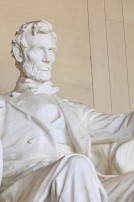The Battle of Gettysburg lasted for three sweltering days in July of 1863, taking the lives of 160,000 Americans. Five months later, on November 19th, President Lincoln arrived to commemorate the battlefield as a National Ceremony. The head speaker was a man named Edward Everett, who delivered a formal speech two hours in length. Lincoln followed him, with a two-minute speech that came to define democracy and cut to the heart of his meaning. We know this as the Gettysburg Address.
“But in a larger sense, we cannot dedicate – we cannot consecrate – we cannot hallow – this ground. The brave men, living and dead, who struggled here, have consecrated it, far above our poor power to add or detract. The world will little note, nor long remember, what we say here, but it can never forget what they did here. It is for us the living, rather, to be dedicated here to the unfinished work which they who fought here have thus far so nobly advanced.” – Abraham Lincoln.
A Powerful Sound
Lincoln died 12 years before Edison invented the phonograph, which was the first device that could record and play back sound. As one of the greatest orators in history, actors and historians alike have tried their best to estimate the voice that moved a nation. Reports of his speech are all that we have to rely on, although many of them are detailed and descriptive. So much could be learned from the way he spoke; so how can we better ourselves and find inspiration from a man who was never recorded?
Tips from the Past
Reports of Lincoln describe a high-voice with a blend of an Indiana and Kentucky accent, but one thing was certain: his tone, style, and delivery was unusual. Author Harold Holzer, a leading Lincoln scholar, poured through reports to find a consistent audience report as he researched his book, Lincoln at Cooper Union.
 “They all seem to say, for the first ten minutes I couldn’t believe the way he looked, the way he
“They all seem to say, for the first ten minutes I couldn’t believe the way he looked, the way he
sounded, his accent. But after ten minutes, the flash of his eyes, the ease of his presentation overcame all doubts, and I was enraptured. I am paraphrasing, but there is ten minutes of saying, what the heck is that, and then all of a sudden it’s the ideas that supersede whatever flaws there are.” – Harold Holzer
Lincoln was also not known to gesture or pace around the stage. Considering that his speeches were often so short, there was no time to spend roaming. His power lay in the words themselves and his striking, off-putting delivery that was uniquely his own.
The “Lincoln Takeaway”
We are moved by Lincoln’s speeches today because of the power and brevity of the content; one could only imagine what a striking delivery would add. The traditional image we have of most strong speakers is a “booming voice” and a few arm unique gestures. The fact that Lincoln used neither gives hope to the scratchy-voiced, high-pitched presenters among us.
Perhaps the next big revelation for presenters will occur when we finally get a time machine and can see one of Lincoln’s speeches firsthand. Until then, we can only be inspired by his written work.
Question: What moves you about the Gettysburg Address?
